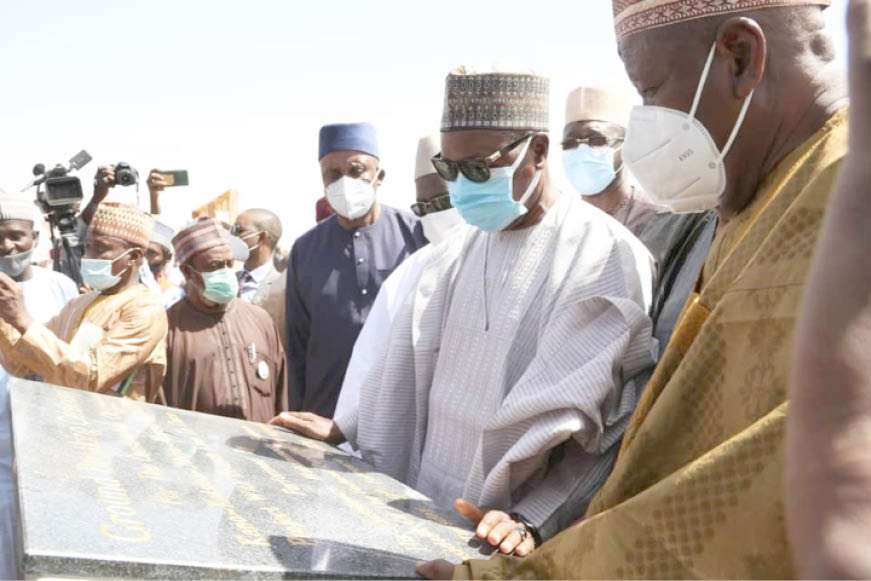The Kano-Maradi train line, whose construction was flagged off a few days ago, continues to generate debates as many Nigerians ponder why the government is building a train line to another country when Nigeria doesn’t have enough. However, in this report, Daily Trust reveals the real reasons behind the project.
A fortnight ago in Makira, Katsina State, the ground-breaking ceremony for the construction of the 284km Kano-Maradi rail line linking Nigeria to the neighbouring Niger Republic was held.
- Abductions: Senate probes FG’s $20m Safe School Initiative fund
- With Adesina, Okonjo-Iweala Nigeria shines again under Buhari
The plan is to boost the Lagos-Kano-Jibiya (LAKAJI) economic corridor, which both the World Bank and the US have been highlighting.
As far back as 2016, the U.S. Agency for International Development (USAID)/Nigeria, in partnership with the West Africa Borderless Alliance, hosted a road governance caravan on the southern segment of the Lagos-Kano-Jibiya (LAKAJI) transport corridor.
The caravan started in Lagos, passed through Ogun and Oyo, and ended in Kwara State.
A 2013 USAID baseline study on the LAKAJI corridor, showed that it costs over $3,000 and takes approximately 12.5 days to send a 20-foot container from Jibiya in northern Nigeria to Lagos in the southwest. Conversely, it costs nearly $5,000 and takes approximately 19.5 days to ship a 20-foot container from Lagos to Jibiya.
High transport cost
The high cost of transporting goods along the corridor is largely due to the lengthy clearance time and associated costs at the Lagos port. The overall cost and delivery times along the Lagos-Kano-Jibiya corridor are significantly greater than similar corridors in West Africa.
Because of this, USAID, bearing in mind the huge economic activities along the LAKAJI corridor suggested the construction of a railway network to link Lagos to Jibiya.
Similarly, a 2018 World Bank report suggested that a “reduction in transport cost between remote and connected rural areas has a bigger welfare impact than a similar reduction in transport cost between cities and connected rural areas–local welfare gains are higher for investments supporting rural connectivity.”
The publication added, “But, for aggregate economic efficiency, there are higher gains from focusing on the development of inter-regional corridors, linking the major urban centres. For example, improvements along the LAKAJI corridor would result in estimated annual benefits of over $1.34 billion.”
Both organisations suggested the construction of a rail track linking Nigeria, a country with massive port activities, to the Niger Republic, a landlocked country.
Economic viability
The Niger Republic depends on Lagos ports for most containers heading to the country and due to the absence of a rail line, containers take up to two weeks from Lagos to Niger and vice-versa by road.
Daily Trust learnt that as far back as 2013, the Federal Government, through the Ministry of Transportation, commissioned a feasibility study to construct a standard gauge rail line from Kano to Maradi in Niger.
In 2015 when President Muhammadu Buhari assumed office, the Transportation Minister, Mr Rotimi Amaechi inherited the feasibility studies and found them to be economically viable.
By September 2020, the government had approved the contract for the line linking Kano-Katsina-Jibia, Dutse and Maradi in the Niger Republic for a total cost of $1,959,744,723.71, inclusive of 7.5% VAT.
This was greeted with outcry from some Nigerians, especially the Southern and Middle Belt Leaders’ Forum (SMBLF), which queried the rationale for building a rail line to the Niger Republic.
However, from the project conception, it was clear that the economic benefits remain the driver of the all-important railway project, which was expected to boost trans-Saharan trade and improve trade relations with Nigeria’s West African neighbours.
The Lagos-Kano rail line
Already, the Federal Government has commenced the Lagos-Kano rail, which has reached Ibadan while the funding for the Ibadan-Kano line, already awarded, is being awaited from the Chinese government.
Daily Trust reports that the China Civil Engineering and Construction Corporation (CCECC), which is going to handle the project has already commenced acquisition of right of way for the Ibadan-Kano single track standard gauge rail.
President Buhari, who wants the project completed before he leaves office in May 2023, flagged off the construction virtually, with governors of Kano, Katsina, Jigawa, the three states benefiting from the line, as well as the Governor of Maradi in the Niger Republic among dignitaries on the ground in Makira, Katsina State
The Kano-Maradi rail has a 36-month completion period while the target is to connect both tracks to allow freight movement from Lagos to Maradi in the Niger Republic.
Though the CCECC has been handling the standard gauge projects across the country, the funding for the Maradi rail line is being sourced from the European Export Credit Agencies and Development Finance Institutions with a Portuguese company, Mota-Engil, constructing the rail line.
Over 9,000 passengers daily
Amaechi explained that the project has a 25Km extension into the Niger Republic and it involves the construction of a single-track standard gauge rail line with an alignment of approximately 284Km traversing Kano–Dambatta–Kazaure–Shargelle–Mashi–Daura–Katsina–Jibiya–Maradi and a 94Km branch line from Kano to Dutse, the capital of Jigawa State.
“The entire network of this project has 15 railway stations of different categories with major stations of approximately 3,000 peak passenger capacity in the cities of Kano and Katsina and stations of standard category in Kazaure, Daura, Jibiya and Dutse and minor stations in Dambatta, Shargelle and Mashi, as well as halt stations in Kunya, Kano airport, Muduru, Dadara and in the Niger Republic at Annol Mata and Maradi.
“The rail line is also provided with accessories and special installations including Power and Water Supply schemes, Signalling System & Communication in GSM-Railway, Freight yards, Rolling stock depots and maintenance workshops,” Amaechi said.
There is a forecast of 9,364 passengers and approximately 3,000 metric tons of freight on return trips between Kano and Maradi daily.
“There is no doubt that this route when linked with the ongoing Lagos – Kano railway project on completion, will generate higher traffic volumes and revenue,” he said.
In a chat with Daily Trust, the Chairman, Governing Board of the Nigerian Railway Corporation (NRC), Mal. Alhassan Musa gave an insight into the LAKAJI corridor economic belt and how the rail line would boost the corridor.
“It is going to serve not just the people of these three states but the whole of the country. It is a project meant to boost economic activities within the LAKAJI corridor. People who don’t know about LAKAJI should go and check it out. It is the Lagos, Kano, Jibiya Economic Belt. There would be economic prosperity for all from the grassroots up,” he said.
He also added that it would cut down freight time from 15 days to two, and would benefit commercial centres like Lagos, Jibiya and Maradi.
But there is another reason.
“The thing is those who know Maradi and Jibiya know that they are springboards for those who want to leave West Africa and go to Europe.
“It is from these places that traffickers carry people into Libya and from Libya by boat to Europe- Italy, Greece and other places.
“So if we create economic activities here, it will make people want to sit down and earn here rather than take the risk of going through the Sahara into oblivion.
“So for many reasons, this is a very good project to serve Nigeria very well, serve West Africa and also it’s part of the greater West African Railway Network.
“Just like we are talking of Trans-Sahara Highway, Trans-Sahara Gas pipeline, we are also talking about Trans-African Railway,” he said.
Kano largest beneficiary
The Kano State Governor, Dr Umar Ganduje said the state is the greatest beneficiary of the infrastructure development of the Buhari-led administration.
According to him, with the ongoing construction of the Kano-Kaduna Road, Kano-Maiduguri and Kano-Katsina Road dualization, the Kano-Maradi rail, when completed, would further boost the economy of the state as a centre of Commerce in Northern Nigeria.
“The railway between Kano, Katsina, Jibiya and Maradi has started, our airport is being extended. So what else do we need when we are talking of development?” he said.
As work begins on the project amidst expectation of the commencement of work on the Ibadan-Kano project, stakeholders say the completion of these projects would boost regional trade and end the plight of manufacturers and traders along the corridor by reducing freight cost from Lagos to other parts of the country.

 Join Daily Trust WhatsApp Community For Quick Access To News and Happenings Around You.
Join Daily Trust WhatsApp Community For Quick Access To News and Happenings Around You.


